Изучение идиом, связанных с названиями частей тела человека
Безусловно, пополнение словарного запаса новой лексикой очень важно в процессе изучения того или иного иностранного языка. А как же быть с устойчивыми словосочетаниями, присущими языку, точнее, являющимися неотъемлемой его частью? Именно идиомы употребляются носителями английского буквально на каждом шагу, поэтому и составляют для нас некую трудность в плане понимания.
В уроке, посвященном изучению идиом, которые связаны с частями тела человека, предлагаются несколько эффективных, интересных и занимательных примеров и заданий быстрого запоминания лексического минимума.
1. Задание заключается в подборе к каждому названию части тела человека определенного прилагательного по смыслу.
Например:
face – oval, round, tanned…
nose – straight, hooked, snub…
chin – massive, pointed, double…
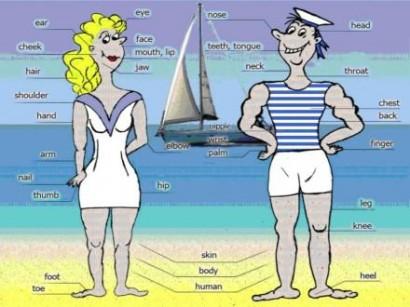
2. Благодаря комиксам процесс изучения новых идиом станет более интересным и увлекательным. Это задание заключается в том, что ученики, получив карточки, ознакамливаются с ключевой фразой, ее дефиницией, а также примерами употребления устойчивых словосочетаний. Упражнение можно разыграть в диалогах по парам.
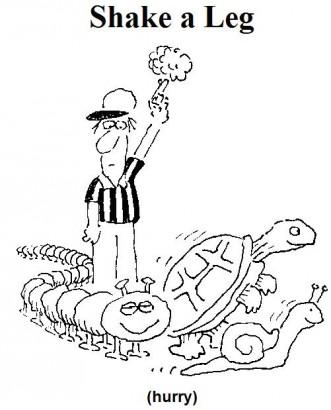
– Mary, you always take such a long time to put on your makeup. Come on, shake a leg!
– I'll be finished in a minute. Be patient. - You've got to hurry or else we won't arrive on time to see the last show.
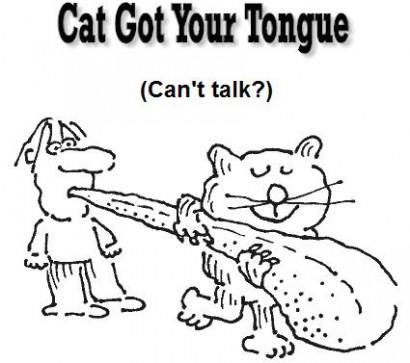
– Come on, Connie! Tell us what you think about our little ride down the rapids yesterday.
– Well, uh...
– Wasn't it exciting?
– I,uh.. .
– What's the matter? Cat got your tongue?
– If you must know, I'm keeping quiet because I was scared out of my wits!

– Children! Would you please stop making so much noise! And for heaven's sake, pick up your clothes and toys! It's hard enough trying to keep this house clean without your throwing your things all over the place!
– Clara, I know that the children get in your hair, but you should try not to let it upset you so much.
– Listen, Jim. I can't help it. The children bother me and make me very angry when they're so noisy and messy.
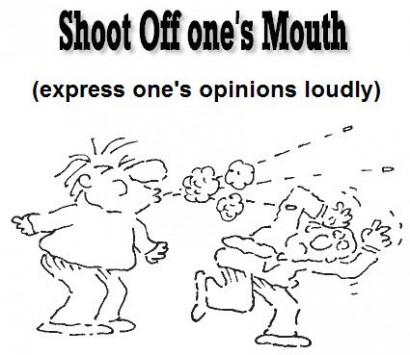
Jim doesn't play tennis very much, but he's always shooting off his mouth about how good he is. Yet he's fooling nobody. Jim is somewhat of a braggart and everyone knows that he gives opinions without knowing all the facts and talks as if he knew everything about the game.
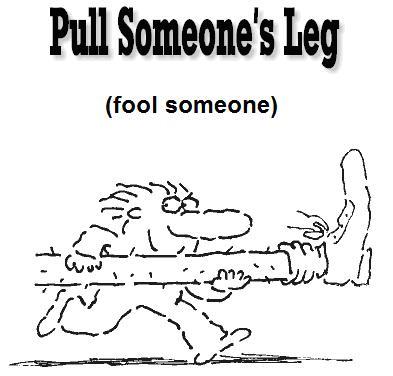
– Hey, Al, I was invited to be a judge for the Miss America Beauty Pageant!
– Oh, really? Come on, you're pulling my leg!
– No, honestly. Do you really think that I'm trying to fool you with a ridiculous story?
– Well, you've told me foolish stories before.
– I can assure you that this one is for real.
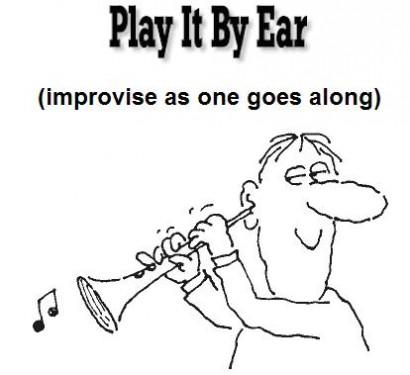
– Let's go to the movies, agreed?
– Sure. And what'll we do after that?
– Oh, I don't know. Let's play it by ear.
– Well, I would like to have a more definite plan of action.
– Don't be like that. It's always more fun not knowing what to expect and deciding what to do as we go along.

– Hey, John. I'm bored. Come on, let's go out and do something.
– Sorry, I'm right in the middle of studying for a physics exam. I won't be able to make it tonight.
– You've been studying for a long time. Why don't you take a break? Come on, let's go. Forget studying for a while.
– Look! Get off my back! I can't go anywhere!
– OK, I'll stop bothering you only if you promise to let me know the minute you're finished.
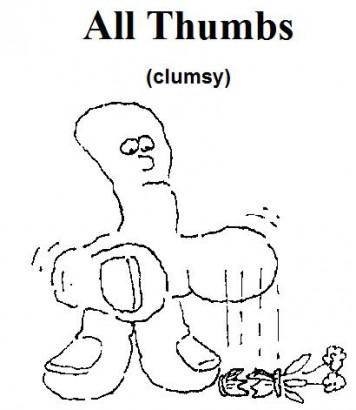
– Hey, Bea. Can you help me out? I don't seem to be able to button up the back of my dress.
– Sure. Let's see if I can do it for you.
– I guess I'm all thumbs because I'm so nervous. I'm already late for my date.
– Well, I suppose that being so nervous would make you clumsy and awkward. But don't worry. I'm sure your date will wait.
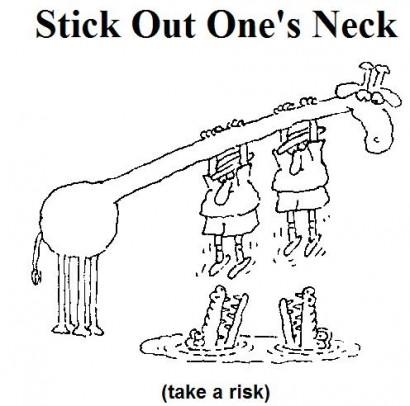
– How come they're asking me to act as their guide through the jungle? Evidently they think you're the only one who can lead them to the lost temple. That jungle has danger lurking around every corner.
– Why should I stick my neck out for them? They didn't pay me for my services. They know that you would be taking a great risk and could possibly get hurt, but you're the only one with enough knowledge to take them to their destination. I'm sure you'll be amply rewarded.

– That's it, Greg! You'd better not come in after midnight again tonight.
– I know, dad. You don't have to jump down my throat! I told you that I'd make it home around 11:50. I don't intend to be late!
– Well, you've said that before and in you come at 2:50 in the morning. You can't blame me for getting angry and scolding you. I've got good reason.
3. Для более эффективного запоминания новой лексики ученикам предлагается тест с правилами, краткой историей возникновения идиомы и примерами ее употребления.
1) an eye-opener
Meaning:
You can say something's an eye-opener if it's made you realize something you hadn't been aware of before.
For example:
Al Gore's movie "An Inconvenient Truth" was a real eye-opener for me. I hadn't really understood how serious global warming was until I saw it.
Cathy said her trip to Thailand was quite an eye-opener for her. She'd never realized before how beautiful Thailand was, or how friendly the people were.
Quick Quiz:
Jenny and the other kids went on their first visit to the zoo today, and it was a real eye-opener for them. They
a) had been there many times before;
b) had never seen animals like that before;
c) were upset because it was closed.
2) behind someone's back
Meaning:
If you do something behind someone's back, you do it without letting them know about it.
For example:
We've taught our kids that it's impolite to talk about people behind their backs.
The nurses had to go behind the doctor's back when they reported him for drinking alcohol before doing operations.
Quick Quiz:
When the player spoke with another team about playing for them, he did it behind his own team's back because
a) he didn't want to play there anymore;
b) he didn't want them to know;
c) he wanted to make more money.
3) ear to the ground
Meaning:
If you have your ear to the ground, you know what's really going on in a situation.
For example:
If we want to market to teenagers, we need someone with an ear to the ground who really knows what they want these days.
I've got this great stockbroker who's got his ear to the ground and always knows when to buy or sell stocks.
Origin:
Possibly related to the fact that Native Americans put an ear to the ground and listen in order to find out if there are animals or other people moving in the distance.
Quick Quiz:
We need someone who has an ear to the ground in Washington to report on
a) American weather;
b) American history;
c) American politics.
4) bite your tongue / hold your tongue
Meaning:
If you bite your tongue, or hold your tongue, you force yourself not to say something you really want to say.
For example:
I wanted to tell Carlos he was being stupid, but I bit my tongue and just sat there.
You're going to have to learn to hold your tongue instead of saying whatever comes into your head.
Note:
These two idioms have the same meaning, though "hold your tongue" is more old-fashioned than "bite your tongue".
Quick Quiz:
You really have to hold your tongue, or bite your tongue, when you're being spoken to by
a) some friends at a party;
b) a waiter in a restaurant;
c) a judge in a courtroom.
5) drag your feet /drag your heels
Meaning:
If you drag your feet, or drag your heels, you do something slowly because you don't really want to do it.
For example:
The government promised to provide universal health care, but now it's dragging its feet over the issue.
We expected the company to drag its heels when it came to paying compensation to the injured workers, but now it doesn't want to pay anything!
Quick Quiz:
If industries are dragging their feet over the issue of developing new technology to reduce carbon emissions, they are
a) doing it very carefully;
b) taking a long time to do it;
c) doing it as quickly as possible.
В качестве домашнего задания каждый ученик выбирает одно определенное название части тела и с помощью словаря составляет небольшой лексический минимум с переводом фраз.
Например:
head:
to head off a quarrel – предотвратить ссору;
head full of bees – голова полна забот;
head over heels – вверх тормашками;
to have a man’s head under one’s girdle – идти на поводу; подчиняться.




























